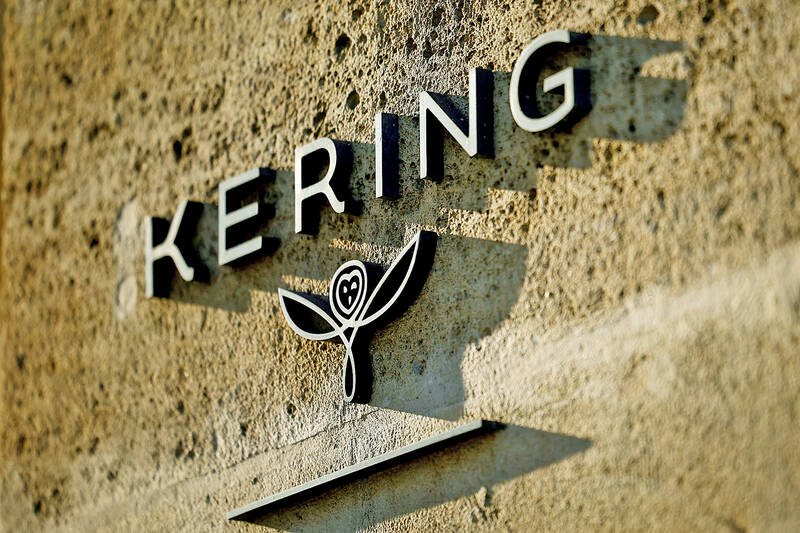Kering SA, the owner of Gucci, has agreed to buy Creed in an all-cash deal as the luxury conglomerate expands in the market for high-end fragrances.
Kering’s beauty unit is buying 100 percent of Creed from funds controlled by BlackRock Inc and its chairman Javier Ferran, the Paris-based luxury group said in a statement on Monday.
Further terms of the transaction were not disclosed.

Photo: Reuters
Creed was established in 1760 by James Henry Creed as a tailoring house that served the royal families of Europe. It still has family involvement.
The French group said it planned to “unlock” Creed’s potential, particularly in China and in travel retail, and expand the feminine fragrance portfolio.
The company is known for its men’s fragrance Aventus. Creed generated annual revenue of more than 250 million euros (US$273.5 million) in the year to March 31.
The acquisition comes after Kering named Raffaella Cornaggia as chief executive of its beauty unit in February as the company aims to grow a segment where rivals such as Hermes International and LVMH Moet Hennessy Louis Vuitton SE have performed well.
Kering has been adding cash to its war chest for potential acquisitions, raising significant proceeds from the sale of its Puma SE stake.
Last year, Kering held talks to buy Tom Ford, the designer brand known for its perfume offering, people familiar with the matter said.
Estee Lauder eventually bought Tom Ford.
Kering is trying to revive its biggest brand Gucci. In April, it said that Gucci sales barely grew in the first quarter, as the Italian label failed to win over more shoppers to products such as Double G belts and furry Princetown slippers.
Kering’s performance seemed particularly lackluster when compared with rivals LVMH and Hermes, which posted double-digit sales growth in the first quarter.
At the time, Kering chief executive Francois-Henri Pinault said that while the performance of the company was mixed, it was starting to see a “gradual improvement in activity month after month.”

Taiwan Semiconductor Manufacturing Co (TSMC, 台積電) would not produce its most advanced technologies in the US next year, Minister of Economic Affairs J.W. Kuo (郭智輝) said yesterday. Kuo made the comment during an appearance at the legislature, hours after the chipmaker announced that it would invest an additional US$100 billion to expand its manufacturing operations in the US. Asked by Taiwan People’s Party Legislator-at-large Chang Chi-kai (張啟楷) if TSMC would allow its most advanced technologies, the yet-to-be-released 2-nanometer and 1.6-nanometer processes, to go to the US in the near term, Kuo denied it. TSMC recently opened its first US factory, which produces 4-nanometer

GREAT SUCCESS: Republican Senator Todd Young expressed surprise at Trump’s comments and said he expects the administration to keep the program running US lawmakers who helped secure billions of dollars in subsidies for domestic semiconductor manufacturing rejected US President Donald Trump’s call to revoke the 2022 CHIPS and Science Act, signaling that any repeal effort in the US Congress would fall short. US Senate Minority Leader Chuck Schumer, who negotiated the law, on Wednesday said that Trump’s demand would fail, while a top Republican proponent, US Senator Todd Young, expressed surprise at the president’s comments and said he expects the administration to keep the program running. The CHIPS Act is “essential for America leading the world in tech, leading the world in AI [artificial

REACTIONS: While most analysts were positive about TSMC’s investment, one said the US expansion could disrupt the company’s supply-demand balance Taiwan Semiconductor Manufacturing Co’s (TSMC, 台積電) new US$100 billion investment in the US would exert a positive effect on the chipmaker’s revenue in the medium term on the back of booming artificial intelligence (AI) chip demand from US chip designers, an International Data Corp (IDC) analyst said yesterday. “This is good for TSMC in terms of business expansion, as its major clients for advanced chips are US chip designers,” IDC senior semiconductor research manager Galen Zeng (曾冠瑋) said by telephone yesterday. “Besides, those US companies all consider supply chain resilience a business imperative,” Zeng said. That meant local supply would

Servers that might contain artificial intelligence (AI)-powering Nvidia Corp chips shipped from the US to Singapore ended up in Malaysia, but their actual final destination remains a mystery, Singaporean Minister for Home Affairs and Law K Shanmugam said yesterday. The US is cracking down on exports of advanced semiconductors to China, seeking to retain a competitive edge over the technology. However, Bloomberg News reported in late January that US officials were probing whether Chinese AI firm DeepSeek (深度求索) bought advanced Nvidia semiconductors through third parties in Singapore, skirting Washington’s restrictions. Shanmugam said the route of the chips emerged in the course of an